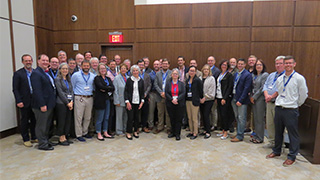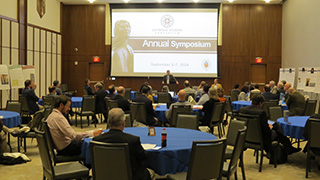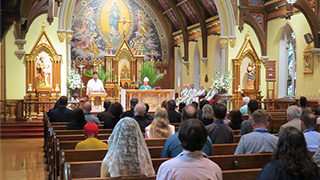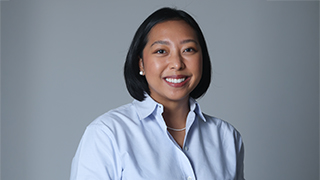Catholic Studies Consortium 2024
Thursday, September 19, 2024
 The Center for Catholic Studies at Seton Hall University was pleased to host the Catholic Studies Consortium for its Annual Symposium from September 5-7, 2024, bringing together nearly 60 leaders
in Catholic Studies from 26 academic institutions.
The Center for Catholic Studies at Seton Hall University was pleased to host the Catholic Studies Consortium for its Annual Symposium from September 5-7, 2024, bringing together nearly 60 leaders
in Catholic Studies from 26 academic institutions.
The Catholic Studies Consortium began in 2021 as a grassroots collaboration of Catholic Studies programs and centers seeking to develop a network for sharing of resources, best practices and ideas to serve those involved in Catholic Studies or similar work. Since the beginning, Seton Hall has played a role in its development, co-sponsoring the previous three symposia and contributing to Consortium working groups and steering committees. Thanks to a generous grant from the Porticus Foundation, the Center for Catholic Studies designed the Consortium website and successfully hosted the Consortium’s 4th Symposium, which formally announced the organization as a professional entity aimed at the renewal and reinvigoration of Catholic higher education through the integration of and participation in the Catholic Intellectual Tradition.
Patrick Manning, Ph.D., director of the Center for Catholic Studies at Seton Hall, remarked: "The creation of this new Catholic Studies Consortium is a hopeful sign for Catholic higher education, and we are proud that Seton Hall has been in a position to help lead the way. At this symposium we set the course for this new, dynamic organization and solidified vital partnerships with other Catholic institutions. It also gave us the opportunity to showcase much of what is best about Seton Hall, including a welcome from our new President, evening prayer with our seminarians and priests, Mass with Cardinal Joseph Tobin, and sharing the inspiring story of our patron, Mother Seton."
 The Symposium at Seton Hall
The Symposium at Seton Hall
The Symposium opened on Thursday, September 5, when the priests and seminarians of Immaculate Conception Seminary School of Theology welcomed the Consortium guests for a Vespers service in the seminary chapel. Later that evening, during the opening receptions, Monsignor Joseph Reilly, S.T.L., Ph.D., president of Seton Hall University, warmly welcomed the attendees, and Manning introduced the conference in light of the story of St. Elizabeth Ann Seton. The evening concluded with an insightful and inspiring presentation delivered by Kenneth Parker, Ph.D., from Duquesne University, and John Boyle, Ph.D., from the University of St. Thomas (Minnesota). Their presentation outlined the history of the "Catholic Studies Movement," beginning at the University of St. Thomas in 1993, followed shortly after in 1997 at Seton Hall University under the direction of Monsignor Richard Liddy, Ph.D., who was also present for the Symposium. The movement, Boyle remarked, is a response to St. John Paul II’s call in paragraph 7 of Ex Corde Ecclesiae for the continuous renewal of Catholic higher education. He explained that Catholic Studies brings to life the university’s pursuit of Truth, Beauty and Goodness in service of the human person.
On Friday, September 6, the symposium featured various sessions related to Catholic Studies centers, academic programs and similar institutes at both Catholic and secular institutions. The morning began with discussions on the official formalization of the Catholic Studies Consortium as a 501c3 organization, led by Raymond Hain, Ph.D., of Providence College, and Kenneth Parker. Parker, the Consortium’s inaugural president, emphasized the collaborative nature of the Consortium, stating, "This is about you and the advancement of the Catholic Studies movement."
The day also included paper presentations focused on best practices in curriculum and collegiate life. Anthony Nicotera, J.D., DSW, LCSW, C-SSWS from Seton Hall University discussed how Seton Hall’s innovative Catholic Studies and social work service-learning course creates a model for interdisciplinary pedagogy. Donald Prudlo, Ph.D., from the University of Tulsa, explored how to engage students with the Catholic Intellectual Tradition through studies of Western civilization, drawing on his experiences with the University of Tulsa's Honors College. Jason King, Ph.D., from St. Mary’s University, reflected on his leadership of a Center for Catholic Studies amid both internal and external challenges, focusing on the role of public theology in higher education.
At noon, Cardinal Joseph Tobin celebrated Mass in the Chapel of the Immaculate Conception. Following Mass and lunch, during a panel on "collegiate life," Father Mark Mossa, SJ, of Loyola University New Orleans, and Raymond Hain, Ph.D., addressed collegiate life. Father Mossa's talk centered on the sacraments, sentimentality, and self-integration, while Hain highlighted a new Catholic Studies in Rome program, which fosters community and holistic growth through the unique opportunity it affords students to study for an entire semester at the Pontifical Irish College, located just a few yards from the Colosseum in Rome, while earing credits from the Gregorian University.
 Closing out the afternoon, participants engaged in a workshop session to develop a
series of Catholic Studies Frequently Asked Questions (FAQs) and their answers to
serve as a resource for institutions looking to create a Catholic Studies academic
program or center at their institution. Guests then made their way to the Immaculate
Conception Chapel for a Taizé prayer service led by Manning with a musical accompaniment
featuring several seminarians. The evening concluded with a dinner reception.
Closing out the afternoon, participants engaged in a workshop session to develop a
series of Catholic Studies Frequently Asked Questions (FAQs) and their answers to
serve as a resource for institutions looking to create a Catholic Studies academic
program or center at their institution. Guests then made their way to the Immaculate
Conception Chapel for a Taizé prayer service led by Manning with a musical accompaniment
featuring several seminarians. The evening concluded with a dinner reception.
For the symposium’s final day, on Saturday, September 7, participants engaged in another round of scholarly presentations. Dawn Apgar, Ph.D., LSW, and Mary Landriau, MSW, LCSW, both from Seton Hall University, discussed the intersection of mental health and Catholic social teaching in education. Michelle Loris, Ph.D., Psy.D., from Sacred Heart University, then spoke about the synodal pedagogy of the Catholic Intellectual Tradition Seminars at Sacred Heart, which encourages intentional discussion and courageous civil discourse. Michael Tomko, Ph.D., from Villanova University, closed the session with a discussion on pedagogical approaches in the Humanities, particularly in light of the ongoing liberal arts crisis at many universities.
The Symposium concluded with a conversation about the Consortium's future, led by Kenneth Parker, and Michael Murphy, Ph.D., Participants expressed enthusiasm for the Consortium's direction and offered valuable feedback on its ongoing development. Parker reflected, "I left Seton Hall University feeling hopeful about the future of Catholic Studies and what it can do to contribute to the advancement of Catholic higher education."
Catholic Studies at Seton Hall
Seton Hall is one of the first Catholic institutions in the United States to have both a Center for Catholic Studies and an Academic Program offering both a major and minor in Catholic Studies. Both are instrumental in living out Seton Hall’s Catholic identity and mission.
Categories: Faith and Service






